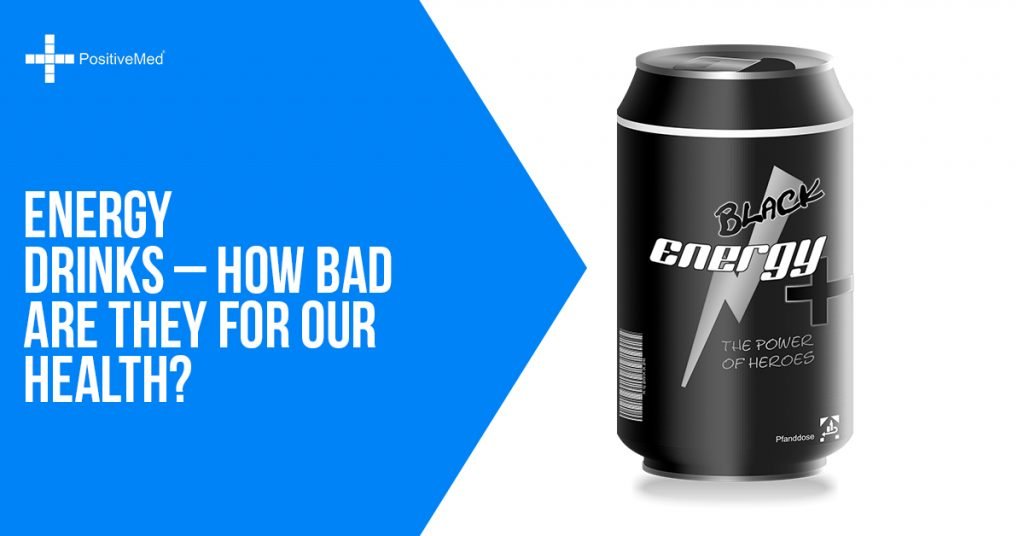Energy drinks have exploded onto the market world-wide. They are replacing our tea and coffee drinking habits. How bad are they for our health?
Energy drinks have become very popular amongst our youth and for those who want a quick pick me up. They are easily accessible and quicker to consume than boiling the kettle for a cup of tea or coffee. Many people crave caffeine and sugar, swearing that they help break through mental fog, tiredness and gives them a boost of energy.
Many of the companies that produce these energy drinks claim that the energy boosts their drinks give you will last for hours. Are these energy drinks good or bad for health? This article discusses the pros and cons of energy drinks, their chemical composition and other ways you can give yourself an energy boost.

Popular energy drinks consumed world-wide include Mother, Dr Pepper, Cocaine, Duff, Jolt Cola, Monster, V and Red Bull. All of these energy drinks contain significant amounts of caffeine. The energy drink with the highest amount of caffeine is Cocaine, with a whopping 280mg per 250ml.
Apart from caffeine; energy drinks often contain the chemical Taurine. Taurine is an amino acid that can be found in meats, fish and breast milk. It helps to improve neurological functions and helps to balance water and mineral salts in the blood. There is no data yet available on the effect that Taurine has on the body over the long term.
Energy drinks also often contain B Vitamins. B vitamins stimulate improved muscular function, boost metabolic rates, supports the nervous system and other bodily systems. They are water soluble vitamins that are quickly eliminated from the body. Sometimes energy drinks contain high amounts of sugar which can give you an initial energy boost but this boost in energy quickly drops after consumption.
The Positive Benefits of Energy Drinks
• Energy Boost
Undoubtedly, energy drinks do give you an energy boost which will help you both physically and mentally to get through a period of low energy levels. They do improve mental alertness and improve physical endurance. Athletes often drink energy drinks before exercising which allows them to perform for longer periods and push themselves harder to achieve fitness goals.
The Health Concerns of Consuming Energy Drinks
• Weight Gain
Being high in sugar they are a calorie time bomb. Drinking excessive amounts of energy drinks can quickly cause you to gain weight. Obesity leads to other serious medical conditions if not addressed early. Energy drinks should only be consumed as an occasional pick me up rather than to solve a daily energy crisis.
• Damages Heart Health
Drinking excessive amounts of energy drinks takes its toll on the heart. It has been medically proven that a person can overdose on energy drinks causing high blood pressure, irregular heart beat, rapid heart beat and chest pain. It can also lead to heart attack.
• Damages the Nervous System
Occasional energy drink consumption does support improved mental alertness but taken regularly can lead to unwanted nervous system problems. Caffeine overdose can cause digital tremors and unexplained twitching of body. Caffeine can affect your sleeping patterns causing difficulty falling asleep, not getting enough sleep and waking up several times in the night. Caffeine can also cause anxiety, nervousness and irritability.
• Stress Hormone Overload
When you consume an energy drink laced with high amounts of caffeine, sugars and other chemicals, your body goes into overdrive to metabolize all these substances. In the metabolic process the body releases high amounts of stress hormones which over the long term can lead to metabolic disorders and other serious diseases.
• Addiction
Many people find that they have become addicted to energy drinks. Drinking an energy drink every day can be considered the beginning of an addictive habit. Withdrawal symptoms are common which include headaches, irritability and mood swings.
The Dangers of Mixing Alcohol with Energy Drinks
Many young people mix alcohol with energy drinks in order to try and get a buzz ignoring that such a mix is dangerous and can lead to death. Energy drinks are stimulants and alcohol is a depressant. The body is placed in a position of extreme stress as it tries to find balance between these to opposing effects. It can put extreme stress on the heart and body often leading to hospitalization.
How You Can Give Yourself a Natural Energy Boost
Taking a brisk walk outside can boost your energy. Often a brisk walk is the last thing you want to do when feeling tired and rundown. A brisk walk gets your blood pumping, the heart beat increases and the brain releases feel good hormones. These hormones also give you a boost in energy and alertness.
Have a chat with people who are a part of your support group. Have a laugh and share happy stories. Happiness is contagious and can cause your energy levels to spike to recharged levels.
Eat a few small meals a day rather than three large meals. Foods that are high in fiber can keep your energy levels stable. Fruits, vegetables, nuts and whole grains are low GI and can help keep your blood sugar levels stable. Hunger can cause energy levels to plummet, so try packing a few small bags with a few healthy snacks to get you through the day.
Drink plenty of water. If possible alkaline water for its proven benefits for the body. Alkaline water helps flush toxins out of your body which may be causing the symptoms of fatigue. Drinking alkaline water can also help boost your overall energy levels when consumed frequently throughout the day.
In conclusion, energy drinks should only be consumed in moderation. If energy drinks are a daily necessity for you then you may be putting yourself in danger of damage to your health. A cup of coffee or tea is a better option as a pick me up than energy drinks. Long term side effects of regular energy drink consumption still is an unknown. Better to be safe than sorry.
About The Author:
Helen Lyle West is a dietitian living in the Birmingham,UK. She is passionate about food and nutrition, keen to explore how it affects the health of individuals and population groups. Helen has also had a lifelong interest in Holistic, Alternative, and complementary medicine.







